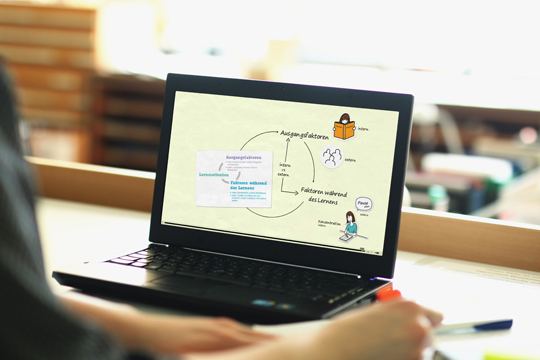Learning with ELIS
Freiburg, Oct 16, 2017
Lots of reading material, dozens of deadlines – time is short, the pulse races. The University of Freiburg is now offering a new online training platform designed to help beginning students: “ELIS” – “Erfolgreich Lernen im Studium” (“learn successfully in a course of study”) – teaches students learning strategies and then helps them to integrate them into their daily lives.

Field test: 150 students completed the online training course “ELIS.” Photo: Sandra Meyndt
Lisa is new at the university. The 18-year-old is studying psychology and will be taking her first exam in two weeks. Her desk is cluttered with piles of books. Lisa sorts, underlines, and draws diagrams; she needs to work through hundreds of pages of literature. Time is short, her pulse races – Lisa has only made it through half of the reading material, and she doesn’t know how she’ll be able to remember the many terms. She begins to doubt whether she’ll be able to pass the exam at all. She always had good grades in school, but now she’s wondering whether the university is really the right place for her.
The University of Freiburg is now offering a new online training platform designed to help beginning students like Lisa: “ELIS” – “Erfolgreich Lernen im Studium” (“learn successfully in a course of study”) – teaches students learning strategies and then helps them to integrate them into their daily lives. “Initially, students are completely overwhelmed with the amount of material they are required to learn,” reports Prof. Dr. Alexander Renkl from the University of Freiburg’s Institute of Psychology. That’s the reason why Renkl and his assistants Jasmin Leber and Timo Endres developed the platform. The idea for it was born in a practical context: “Our department was always asked to say something about learning strategies in the first week of an introductory lecture at the Institute of Psychology. We complied with this request, but always in the knowledge that you can’t teach anything that leads to substantial effects in the learners in this time. That gave us the idea of developing an online training platform,” explains Renkl.

“ELIS” is the name of the cartoon figure that guides students through the University of Freiburg’s new online training course. The acronym stands for “Erfolgreich Lernen im Studium” (“learn successfully in a course of study”).Illustrations: Steffen Weyreter/University of Freiburg
The platform received the University of Freiburg’s Instructional Development Award (IDA) in 2015. The psychologists used the 70,000 euros in funding from the award to refine the platform in the lab and then test it on around 150 psychology students in an initial application phase in the 2016/2017 winter semester. In contrast to the commercially available self-help literature on the topic, ELIS helps students to apply learning strategies in their daily lives. “This is the first systematic online learning strategy training platform ever, and it is even connected to the authentic learning situation,” emphasizes Leber.
The Platform Accounts for Prior Knowledge
A cartoon figure, also named ELIS, guides users through the three modules on various learning strategies. The strategies are illustrated in videos, texts, and diagrams. “We were inspired in developing it by so-called MOOCs, massive open online courses, which enable individual learning,” explains Endres. In contrast to MOOCs, however, the use of the tool is not bound to a particular date and time. Hence, the users control their learning on their own. They choose when to start each module and review the material in several consecutive learning phases. And what’s more, ELIS adapts itself to fit the users’ prior knowledge.
When Lisa uses the learning platform, she thus first takes a test in which she has to rate several statements on her learning strategies and study scenarios from daily life. What does she do when she can no longer concentrate and is behind schedule? Does she take a twenty-minute nap, or does she change her learning environment? What tactic helps her when she’s under a lot of pressure? Should she start by skimming through a text for a seminar meeting to grasp its basic structure or is it better read it several times through? After Lisa has rated the various statements, the program calculates what she knows about learning strategies in the background and then presents her with tasks tailored to her prior knowledge in the three learning modules.
Plan, control and put it to good use
Lisa decides to begin with the module on resource-oriented learning strategies. They help to improve the learning environment, organize the learning process, and develop motivation. One of the things Lisa learns in this module is that she can lengthen her concentration span actively by progressively increasing the time she spends concentrating on a task. In the module on cognitive learning strategies, Lisa learns how to reduce the complexity of the learning material. The tool suggests that she should organize the technical terms using visual representations like mind maps or concept maps. This is something she already knows from school. Students do not learn without any strategies at all, of that Renkl is certain: “Most students learn in the course of time very well to organize the material. They make diagrams and underline important terms. But our training makes them better at these things too.”
The metacognitive learning strategies covered in the third module serve to ensure that learning goals are actually reached. “Students often succumb to illusions of understanding. They do not monitor their understanding but rather think that if they have already heard something once, they can do it. The tool is designed to make them more critical,” says Renkl. One advisable method is to compare learning goals and knowledge progress, for instance with learning protocols: The students ask themselves key questions to test for themselves how much they already know about a topic. This works best directly after a study session, when the material is still fresh in the student’s mind, and then again several days later.

ELIS is satisfied. The learning strategies are grouped into various modules and are designed among other things to help students to plan and control their learning processes. Illustration: Steffen Weyreter/University of Freiburg
The strategies presented on the online training platform focus particularly on knowledge retrieval. “Most students learn by reading a text, reading it again, and then reading the summary. However, merely reading a text again is not a very effective way to learn something by heart – that’s what our research indicates,” explains Endres. It is much more effective to begin by calling back to mind what one has read. Psychologists refer to this as the testing effect or retrieval-based learning. “This links the knowledge to prior knowledge in the brain and consolidates it. The retrieval trains the brain for the concrete exam situation, as it were,” adds Renkl. The tool communicates this principle on an individual basis: The system tests Lisa’s newly acquired knowledge about learning strategies between the learning phases by again asking her questions from the initial test: Have her responses changed? Has she internalized the techniques?
In the second part, the program helps Lisa to come up with concrete situations for applying and practicing the learning strategies. This involves formulating so-called implementation intentions, which follow an “if–then” pattern: If Lisa has finished reading a chapter in a textbook, for example, then she will apply learning strategy A. Since Lisa has set these intentions beforehand with the help of the training platform, it’s easier for her to actually apply the learning strategies in daily life.
The online training platform ELIS has been available to all students at the Institute of Psychology since February 2017. “It currently serves a dual function. We are now at the point where we can already offer it to the students as a fully functional tool, but we’re still testing in the background whether everything works right and whether we can improve any of the content,” says Jasmin Leber. “In the long term we envision that it might also be used at other faculties.”
Sonja Seidel
ELIS – Erfolgreich Lernen im Studium (learn successfully in a course of study)
https://elis.vm.uni-freiburg.de

